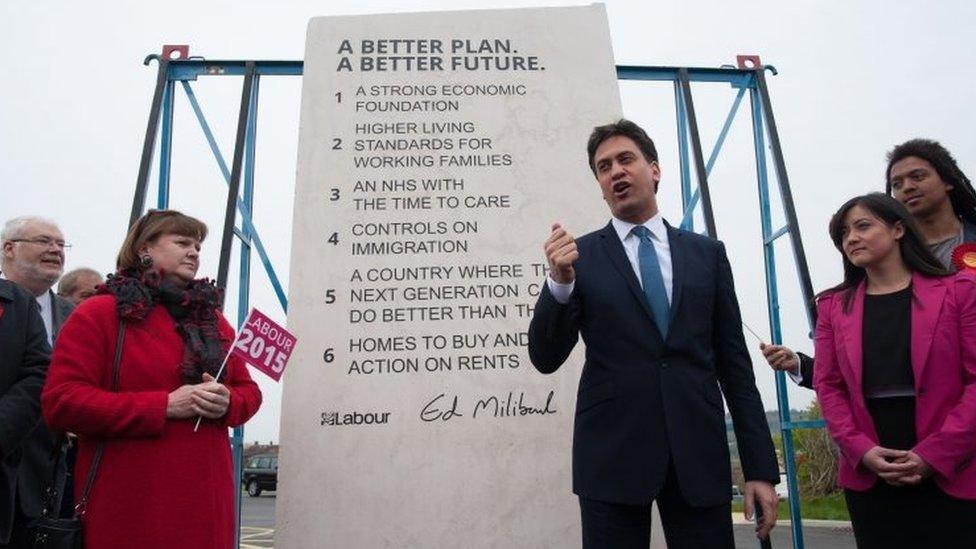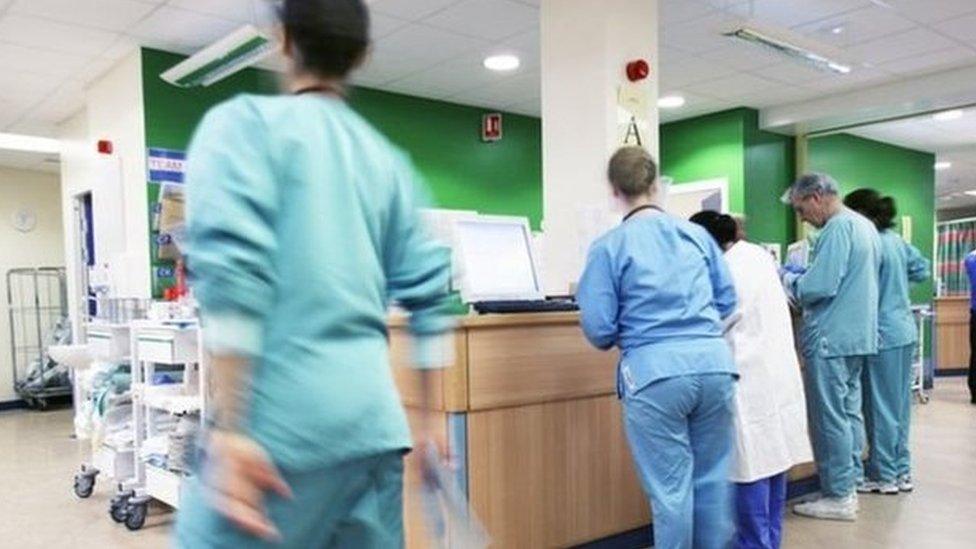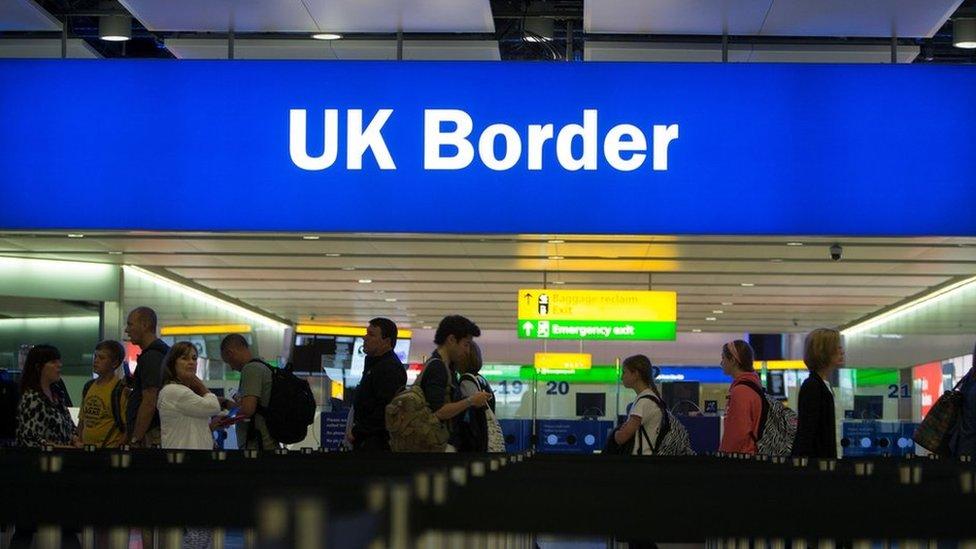Why wasn't 2015 the 'Brexit election'?
- Published

Europe did not get a mention on the 'Edstone'
Now that Britain is on its way out of the European Union, Brexit is a major issue at a general election. How much of an issue was it two years ago before the referendum had been held?
Remember the 2015 general election? Ed Miliband and the bacon sandwich. The shock on Labour and Lib Dem faces when the result was announced. A lot of talk about coalition "red lines" and the Conservatives' "long-term economic plan".
That's probably about it.
One thing you won't remember is much meaningful or sustained debate about Britain's membership of the European Union. Because there was hardly any.
Brexit was on the ballot paper in 2015 - the Conservatives had promised a referendum by 2017 if they won the election and Labour were against a referendum (unless a "significant transfer of power" to Brussels had occurred).
As it turned out Britain's continued membership of the EU was arguably the biggest issue facing the country. But it suited both sides to talk about other things.

The then Labour leader Ed Miliband made a big speech at the start of the campaign, in the City of London, about how a British exit from the EU would harm the economy.
But the party was nervous that Mr Miliband's decision to rule out an in/out referendum would make it look like he was scared of giving people a say. So Mr Miliband fell back on safer Labour territory such as the NHS and public spending.
David Cameron also believed Britain would be worse off outside the EU. He had promised a referendum in 2013 - after years of saying he would do no such thing - to stem the growing tide of Euroscepticism in his own party and the rise of UKIP.
He had set a lot of store by his plan to renegotiate Britain's membership of the EU, but said little during the 2015 campaign about what the terms of these negotiations would be.
But the promise of the referendum was a good way of responding to UKIP's appeal in seats which the Conservatives needed to win or hold on to.
As polling day approached, he mostly confined his remarks to warnings about the instability and "chaos" that he said would result from an Ed Miliband government propped up by the SNP.

The NHS was the issue people cared about most ahead of the 2015 election, according to pollsters
SNP leader Nicola Sturgeon teamed up with nationalist leaders in Wales and Northern Ireland to demand a veto on Britain's exit from the EU, but it was not the main focus of her campaign.
Some on the pro-EU side of the debate argued the British people were being cheated out of a debate, external about the biggest issue facing the country.
While Matthew Elliott - who would go on to run the Vote Leave campaign - said in a prescient article for The Daily Telegraph, external that British business needed to wake up to the possibility of a referendum, which he said was "virtually inevitable in the medium-term" whoever won the election.
But the political parties could claim with some justification that the public were just not that interested in Brexit in May 2015. It was not "coming up on the doorstep".
The NHS was the issue people cared about the most as the 2015 polling day approached, according to pollsters IPSOS Mori, external.
The EU did not even appear in the company's "issues index". Now, in the wake of the Brexit vote, it occupies the top slot, external.

Immigration was then, and remains now, an issue that the public care deeply about
There was one party that did talk about Europe at the 2015 general election. A lot. And many people listened, although it was EU immigration - rather than Parliamentary sovereignty and trade deals with Brussels - that lit a bonfire under UKIP's vote.
Immigration was then, and remains now, an issue that the public care deeply about, according to IPSOS Mori's index, and then UKIP leader Nigel Farage seized on it as a way to sell his anti-EU message to voters who had little interest in the finer points of qualified majority voting.
Mr Farage believed Mr Cameron would have to form another coalition government and that his party would need enough MPs to force the prime minister to stick to his referendum promise.
Some on the Eurosceptic right of the Conservative Party also suspected Mr Cameron was working on the assumption that he would have to form another coalition with the fiercely pro-EU Liberal Democrats, who would try to block a referendum.
In fact, then Lib Dem leader Nick Clegg was prepared to accept an EU referendum in exchange for concessions in other areas.
He wanted a veto if the prime minister returned from Brussels with no deal, saying he could not "accept being part of a government that advocated withdrawal from the European Union". On that, as in many other things, he was perfectly in tune with David Cameron.
Giles Dilnot reports on where parties stand on an EU referendum and how it may affect the 2015 general election result.
But it was all academic in the end because the Lib Dems were virtually wiped out, UKIP only got one MP - despite getting nearly four million votes - and a victorious Mr Cameron opted to hold a referendum as soon as he could.
Some say there should have been more debate about Brexit in 2015.
But at the time the Conservative policy was the promise of a referendum - which meant leaving the EU was a theoretical issue to be tackled down the road, rather than a direct consequence of how people voted in the general election.
It was enough to stop any chance of pro-EU voters banding together across party lines to block a referendum, and enough to stop the army of politically disengaged voters who backed Leave in the referendum pushing UKIP across the line in more seats.
So perhaps the real lesson of 2015 is that whatever the big issues being tackled during this campaign - there might be another one which will have a bigger impact on the country's future.